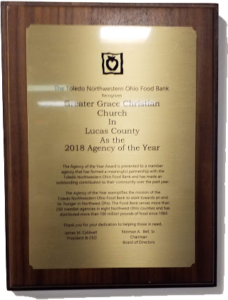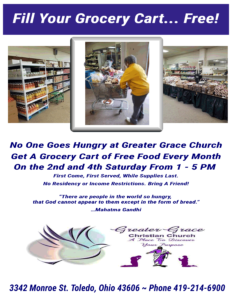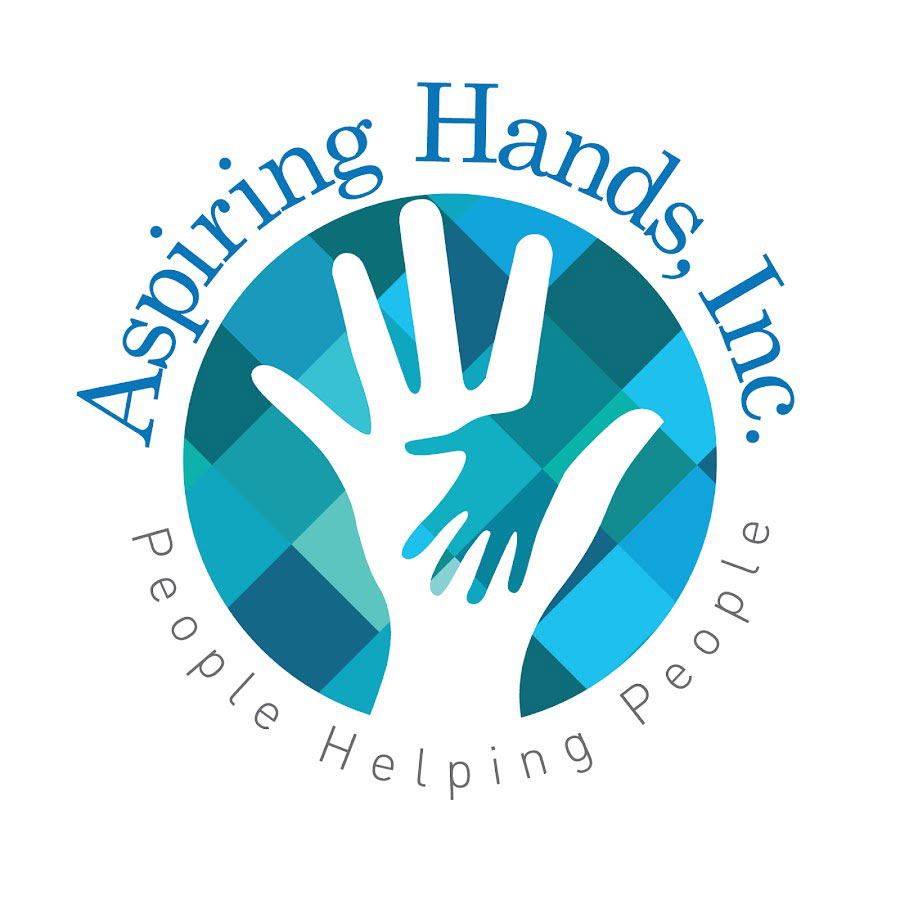Help Feed Toledo Economy, Education, Employment, Engagement, Equality, Healthcare, Inclusion, Infrastructure, Sustainability, Transparency
Food Insecurity Isn’t about Food, It’s about Income
Welcome to Greater Grace Food Pantry, How May We Help You?
I’m Here to Invest in the Elimination of Poverty
I’m Here to Make a Tremendous Difference Immediately
I’m Here to Invest My Time and Resources
I’m Here to Invest Company, Non-profit or Organization Time and Resources
Attention, Donors and Investors: Food Insecurity – A Hidden Investment Opportunity



Greater Grace Food Pantry is the current award winner of the agency of the year awarded by the Toledo Northwest Ohio food bank.
So, what’s the game plan?
Quit the “do more” mantra. The rising need isn’t about a food shortage but an income gap. Feeding America doubled its output, yet hunger persists. We need to stop assuming that doing more is the solution.
Food banks aren’t just about handing out food; they’re in the leverage business. Forget the one-size-fits-all approach; focus on providing more of some of what families need. “More of some” beats “some of all” for maximizing assistance value. And the future? It’s in produce. Invest in infrastructure to handle surplus produce, and watch the impact soar.
To end the line, keep serving it. With billions in resources and collaborations with 60,000 organizations, we’re a big player. But, it’s time to take equity seriously. Target resources to underserved communities using data. Let’s include those we serve in decisions. Equity isn’t just talk; we have the power to make it real.
Think like investors. Don’t just pass out food; invest it strategically. Check efficacy and scale – if it’s not impacting at least one percent of the population, it’s not enough. We need to put other missions first. Partner with organizations like community colleges for real impact. Be a food scholarship foundation, not just a food distributor.
Investors, don’t miss out on this opportunity!
We need to advocate beyond food. Whether it’s SNAP enhancement, child tax credits, or higher wages, any win counts. Don’t pigeonhole us as just food advocates. Food banks can be conveners – bringing struggling individuals and those wanting to help to the table.
Investors, this is the call you don’t want to miss. Food insecurity is not just a problem; it’s an investment opportunity. Join us in rewriting history, tackling income insecurity, and making a real impact.
Complex Causes of Poverty and Greater Grace’s Solution
| Causes of Poverty | Food Pantry and Wraparound Service Solutions |
|---|---|
| Lack of Education |
Education Resource Hub: Collaborate with local schools and community organizations to provide educational resources, including tutoring services, literacy programs, and school supplies for children and adults. |
| Limited Access to Healthcare |
Health and Wellness Workshops: Offer workshops on basic healthcare, nutrition, and preventive health measures. Partner with local healthcare professionals to provide basic health screenings and information. |
| Unemployment and Underemployment |
Job Assistance Programs: Provide job search resources, resume-building workshops, and connections to local employment opportunities. Collaborate with businesses for job fairs and vocational training sessions. |
| Discrimination and Inequality |
Community Support Groups: Establish support groups that focus on addressing discrimination, fostering inclusivity, and providing emotional support. Work with local organizations to promote diversity awareness. |
| Lack of Financial Inclusion |
Financial Counseling Services: Offer basic financial literacy and budgeting workshops. Collaborate with local banks or credit unions to provide information on opening bank accounts and accessing financial services. |
| Corruption |
Advocacy and Support: Provide information on local resources for reporting corruption or unfair practices. Advocate for transparency and fairness in local government services. |
| Political Instability |
Community Engagement Events: Organize community events to encourage civic participation, dialogue, and collaboration. Empower community members to voice concerns and contribute to local decision-making processes. |
| Environmental Degradation |
Community Gardens: Establish community gardens to promote sustainable practices, provide fresh produce, and educate on environmental responsibility. |
| Lack of Infrastructure |
Transportation Assistance: Collaborate with local transportation services to provide discounted or free transportation options for pantry users. |
| Global Economic Factors |
Local Economic Empowerment Programs: Work with local businesses to create partnerships that provide job opportunities and support economic development initiatives within the community. |
Meet Them With a Hand Out. Then, Offer a Hand Up
Want to Make a Tremendous Difference Immediately?
CLICK to share this flier on Facebook and provide $3000+ in food per family every year. Sound too good to be true? Each family receives a cart full of healthy choice food ($125+ Value).
This adds $250 to their monthly food budget for a total of $3000/yr. and only costs two seconds of your time to CLICK and Share.
Plan of Action to Address the Root Causes of Poverty




Creating a comprehensive plan to address the root causes of poverty and support food pantry members in becoming self-sufficient involves a multifaceted approach that considers various factors contributing to poverty. Here’s an outline for such a plan:
1. Needs Assessment and Goal Setting:
a. Conduct Assessments:
– Assess guests’ needs, including skills, education, health, and employment status.
– Identify common barriers to self-sufficiency among the guests.
b. Set SMART Goals:
– Collaborate with guests to set Specific, Measurable, Achievable, Relevant, and Time-bound goals for self-sufficiency.
2. Education and Skills Development:
a. Job Training and Workshops:
– Provide vocational training programs aligned with local job market needs.
– Offer workshops on resume building, interview skills, and job search strategies.
b. Financial Literacy and Management:
– Conduct workshops on budgeting, saving, debt management, and accessing financial resources.
– Offer access to financial advisors or counselors.
3. Access to Resources and Services:
a. Healthcare and Wellness:
– Facilitate access to healthcare services, mental health support, and wellness programs.
– Collaborate with local healthcare providers for regular check-ups and health education.
b. Housing Assistance:
– Connect guests with housing resources, rental assistance programs, or transitional housing options.
– Provide guidance on tenant rights and responsibilities.
c. Childcare Support:
– Partner with childcare services or offer subsidies for guests with children to enable their participation in training or work.
4. Entrepreneurship and Microfinance:
a. Business Development Support:
– Provide entrepreneurship training and mentorship for guests interested in starting small businesses.
– Facilitate access to microfinance or small business loans.
5. Community Engagement and Support Networks:
a. Peer Support Groups:
– Establish support groups where guests can share experiences, provide mutual support, and exchange resources.
b. Networking Opportunities:
– Organize networking events, job fairs, or community gatherings to connect guests with potential employers or mentors.
6. Long-Term Follow-Up and Evaluation:
a. Continuous Support:
– Offer ongoing support and counseling to monitor progress and address new challenges.
– Adjust services based on feedback and changing needs of guests.
b. Evaluation and Impact Assessment:
– Regularly evaluate the program’s effectiveness and impact on guests’ self-sufficiency.
– Use feedback and data to improve and refine the program.
7. Collaboration and Partnerships:
a. Collaborate with Local Organizations:
– Partner with government agencies, NGOs, educational institutions, and local businesses to expand resources and opportunities for guests.
b. Community Involvement:
– Engage community leaders and volunteers to create a supportive environment for guests striving for self-sufficiency.
Implementing a comprehensive plan to address the root causes of poverty requires a collaborative effort and ongoing commitment from various stakeholders. By focusing on education, skill-building, access to resources, fostering community support, and continuous evaluation, the goal of helping food pantry guests achieve self-sufficiency becomes more achievable. Regular monitoring, flexibility, and adapting to the changing needs of guests are crucial for the success of such a program.
Free Example to Solve Some, and Greatly Reduce Other, Causes of Poverty
Transforming Lives: Linux Empowers Seniors and Families
In the realm of education, high school students are reshaping the narrative by revitalizing outdated computers with the power of Xubuntu. This isn’t just about technology; it’s a movement, and here’s why it matters.
For seniors, Xubuntu acts as a digital superhero, providing security and rejuvenation for aging computers. It’s like fitting their devices with an impenetrable force field, ensuring a secure online experience.
In low-income families, Xubuntu becomes a catalyst for change, offering financial education and job training opportunities. It’s a toolkit for success, empowering individuals to confidently step into the job market and navigate the maze of economic intricacies.
But the story doesn’t end there. High school students are not just embracing Xubuntu; they’re tapping into the power of free Google Drive for business and productivity. It’s like having a virtual office at your fingertips, fostering collaboration and organization without the price tag.
And let’s not forget LinkedIn Learning, a valuable resource offered for free through the Toledo Lucas-County Public Library. Imagine a world where education knows no boundaries, where individuals can access a wealth of knowledge and skills to fuel their personal and professional growth.
Oh, and did we mention? Xubuntu is free. It’s not just a technological makeover; it’s a revolution, one computer at a time. Join the movement, invest in a future where knowledge reaches every corner, touching lives and creating a ripple effect of positive change.
*Food Insecurity Isn’t About Food; Here’s What To Do About It
How You Can Add Value
Here are some of the many ways you as an individual can add value to your community:
1. Expertise and Advisory Support:
Strategic Planning: Offer strategic guidance and expertise in developing long-term plans for the pantry’s growth and sustainability.
Operational Efficiency: Provide insights and advice on improving operational processes, logistics, and resource management.
2. Networking and Partnership Building:
Introductions and Connections: Leverage their network to introduce the pantry to potential collaborators, donors, or community partners.
Collaborative Opportunities: Facilitate partnerships with other organizations, businesses, or foundations that align with the pantry’s goals.
3. Capacity Building and Training:
Skill Development: Conduct workshops or training sessions to enhance the skills of pantry staff and volunteers in areas such as leadership, management, or food safety.
Professional Development: Offer mentorship or coaching programs for staff or volunteers to foster personal and professional growth.
4. Technology and Innovation:
Tech Integration: Assist in adopting technology solutions to streamline operations, manage inventory, or improve communication with clients and donors.
Innovation Initiatives: Support innovation projects or pilot programs that could improve service delivery or outreach strategies.
5. Marketing and Public Relations:
Brand Visibility: Help elevate the pantry’s visibility through marketing strategies, social media campaigns, or public relations efforts to attract more support and volunteers.
Storytelling: Aid in crafting compelling narratives and success stories to effectively communicate the pantry’s impact on the community.
6. Policy and Advocacy Support:
Policy Engagement: Offer expertise in advocating for policies that address food insecurity, poverty, or nutrition-related issues at local, state, or national levels.
Community Engagement: Assist in community engagement initiatives, including organizing events or campaigns to raise awareness about food insecurity.
7. Resource Mobilization and Fundraising:
In-Kind Donations: Encourage and facilitate donations of goods, equipment, or services from other businesses or individuals.
Fundraising Events: Help organize fundraising events or campaigns to generate support and resources for the pantry.
8. Evaluation and Impact Assessment:
Outcome Measurement: Assist in developing assessment tools or frameworks to measure the pantry’s impact and effectiveness in addressing food insecurity.
Data Analysis: Provide expertise in data analysis to derive insights for program improvements and future planning.
9. Volunteer Engagement and Management:
Volunteer Programs: Assist in designing volunteer recruitment strategies, training programs, and recognition initiatives to enhance volunteer engagement.
10. Cultural Sensitivity and Diversity:
Cultural Competency Training: Offer guidance on tailoring services to diverse communities, ensuring cultural sensitivity in food offerings and service delivery.
11. Education and Nutrition Programs:
Nutrition Education: Support the development of nutrition-focused programs or workshops for pantry users to promote healthy eating habits.
Cooking Classes: Organize cooking classes or demonstrations using available pantry items to encourage creative and nutritious meal preparation.
12. Sustainability and Green Initiatives:
Environmental Sustainability: Assist in implementing eco-friendly practices, reducing food waste, or exploring sustainable sourcing options.
By contributing your expertise, networks, skills, and time, you can significantly enrich our offerings, helping us serve your community more effectively and sustainably.
Become a Strategic Ally
Here are some of the many ways your company, non-profit or organization can become a strategic ally to eliminate the complex root causes of poverty:
1. Education and Skill Development:
Training Programs: Fund vocational training or educational programs tailored to the specific needs and interests of pantry clients, enabling them to acquire new skills for employment opportunities.
Financial Literacy: Support workshops or courses focused on financial literacy, budgeting, and personal finance management to promote financial independence.
2. Career Counseling and Employment Support:
Career Guidance: Sponsor career counseling services to assist clients in identifying career paths, resume writing, interview skills, and job search strategies.
Job Placement Programs: Support initiatives that facilitate job placement or create connections with potential employers.
3. Entrepreneurship and Small Business Support:
Business Incubation: Provide resources or mentorship for aspiring entrepreneurs, assisting them in starting and managing small businesses.
Microfinance Initiatives: Fund microfinance programs that offer small loans or financial support to clients aiming to establish their businesses.
4. Housing Assistance and Stability:
Housing Programs: Support initiatives providing housing assistance, rental subsidies, or transitional housing options to help clients secure stable living arrangements.
Homeownership Programs: Sponsor homeownership workshops or down payment assistance programs for clients aiming to own a home.
5. Healthcare Access and Wellness Initiatives:
Health Services: Fund healthcare programs providing access to medical care, mental health services, or preventive health screenings for pantry clients.
Nutrition and Wellness: Support nutrition education, fitness programs, or wellness initiatives to promote healthy lifestyles and well-being.
6. Legal Aid and Advocacy Support:
Legal Assistance: Support legal aid programs providing guidance on tenant rights, immigration issues, or access to justice for clients facing legal challenges.
Advocacy Efforts: Fund advocacy campaigns or initiatives aimed at addressing systemic issues contributing to poverty within the community.
7. Childcare and Family Support Services:
Childcare Programs: Support childcare services or subsidies that enable parents to pursue education or employment opportunities.
Family Support: Fund family counseling, parenting classes, or support groups to strengthen family dynamics and stability.
8. Transportation Assistance:
Transportation Programs: Support transportation vouchers, public transit subsidies, or carpool initiatives to improve access to work, education, and essential services for clients.
9. Technology Access and Digital Literacy:
Digital Inclusion: Provide access to technology devices, internet connectivity, and digital literacy programs to bridge the digital divide and enhance job prospects.
10. Mentorship and Peer Support:
Mentoring Programs: Facilitate mentorship opportunities where successful individuals can guide and support clients in setting and achieving personal and professional goals.
Peer Support Networks: Fund peer support groups or networks where clients can share experiences, provide mutual support, and access resources together.
11. Community Engagement and Empowerment:
Community Projects: Support community-driven projects initiated by pantry clients, empowering them to take leadership roles and make positive changes in their communities.
Civic Engagement: Encourage involvement in community activities, volunteering, or civic engagement initiatives to foster a sense of belonging and empowerment.
12. Holistic Wraparound Services:
Integrated Support: Encourage the pantry to offer comprehensive services, including case management, counseling, and referral services, to address clients’ diverse needs holistically.
By focusing on these diverse aspects and providing targeted support, your company, non-profit or organization can become a strategic partner to empower food pantry members towards self-sufficiency, addressing the root causes of poverty, and fostering sustainable positive change in their lives.











